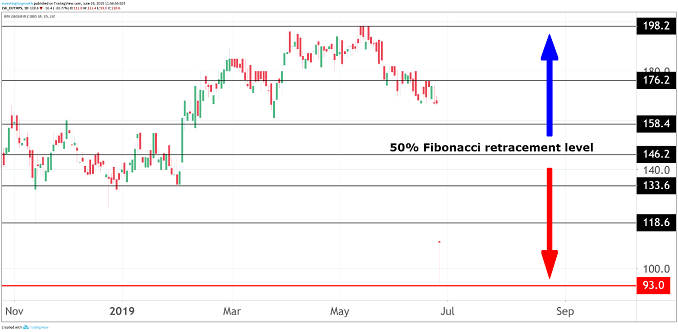RPS blames Aussies for share price collapse
Profit forecasts slashed and rising debt threatening the dividend, will this crash attract bidders?
26th June 2019 12:44
by Graeme Evans from interactive investor
Profit forecasts slashed and rising debt threatening the dividend, will this crash attract bidders?

A recovery for RPS Group (LSE:RPS) since an October profit warning has proved to be short-lived after Australia's slowing economy derailed progress at the environmental consultancy.
The latest warning sent shares in the Abingdon-based business crashing by as much as 44% to levels not seen in the 21st Century. The former FTSE 250 index stock, which began life as a rural planning services firm in 1970, employs more than 5,500 staff across 125 countries and in six sectors covering property, energy, transport, water, defence and government services.
Given the material cut to expectations for 2019 results, today's update will heighten focus on the future of a generous dividend that has contributed to a forward yield of 5.9%. It will also reignite speculation about the potential for takeover approaches, with RPS reportedly involved in talks with private equity firm Charterhouse at the end of 2018.
That interest aside, investors will left be wondering about the stock market adage that profit warnings tend to come in threes. The shares also fell sharply in October after a warning that fee income was marginally below expectations.

Source: TradingView Past performance is not a guide to future performance
While other parts of the RPS business have performed resiliently since then, including energy, there's been no hiding place from a range of challenges in Australia as the country's economy experiences its slowest growth since 2009 and a weak property market.
RPS's project management business has also been affected by the impact of May's Federal election on major defence project spending. And in a further blow for RPS following its February acquisition of Corview, public sector infrastructure spending has been affected by recent state elections in Victoria and New South Wales.
While the Australian division accounted for a fifth of RPS's £637.4 million of revenues in 2018, chief executive John Douglas says the company remains "well placed to benefit" once the Australian market recovers.
The problems Down Under have been exacerbated by RPS's biggest market of the UK, where Brexit uncertainty means the consulting division is now trading slightly below expectations.
Following today's warning, analysts at Numis Securities reduced their earnings per share (EPS) forecast for 2019 by 30% to 11.7p, driven by an expected 12% decline in net fee income for the Australian division.
Numis predicts an increase in net debt to £93.4 million, which it thinks will limit the opportunity for further bolt-on acquisitions in the short term.
RBC Capital Markets said it was encouraging that the company's strategy implemented in 2017 to transform the business from an "unfocused conglomerate into an internationally recognised environmental consultancy" remained on track.
However, they added that the update underlined the vulnerability of the model to market volatility, even though the majority of this looks more to do with timing than fundamental changes to underlying markets.
RBC said bid expectations were now likely to come back onto the table, while the current dividend would also be in focus.
The pay-out for last year was kept at 9.88p a share, amounting to a total of £22.1 million. However, RPS said the pay-out ratio of 60% of adjusted EPS was too high, compared with the ratio of less than 40% prior to 2015.
It said at the time:
"Whilst the board has no current intention of reducing the future full year dividend, increases are only likely once earnings have grown and the pay-out ratio is at or around this level (40%)."
With shares trading on a 2019 price/earnings (PE) multiple of 13.8x, house broker Liberum today reduced its target price from 230p to 170p to reflect the lower earnings.
These articles are provided for information purposes only. Occasionally, an opinion about whether to buy or sell a specific investment may be provided by third parties. The content is not intended to be a personal recommendation to buy or sell any financial instrument or product, or to adopt any investment strategy as it is not provided based on an assessment of your investing knowledge and experience, your financial situation or your investment objectives. The value of your investments, and the income derived from them, may go down as well as up. You may not get back all the money that you invest. The investments referred to in this article may not be suitable for all investors, and if in doubt, an investor should seek advice from a qualified investment adviser.
Full performance can be found on the company or index summary page on the interactive investor website. Simply click on the company's or index name highlighted in the article.